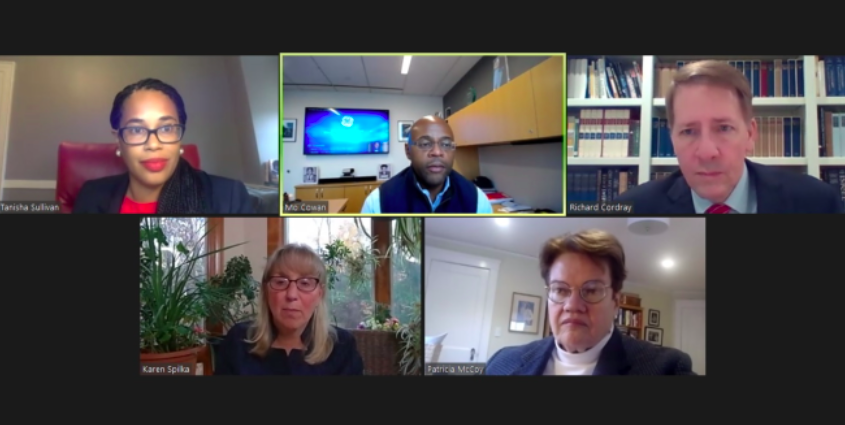Equity concerns spark discussion about school year

Katie Lannan | State House News Service | October 29, 2020
BOSTON (SHNS) – As policymakers think about ways to address learning disruptions students are experiencing during the COVID-19 pandemic, one potential tool that got attention during a Boston College webinar Thursday was the concept of restructuring the academic calendar.
During a Rappaport Center for Law and Public Policy discussion on race and economic justice, law professor Patricia McCoy read a question — submitted by audience member and Lawrence Mayor Dan Rivera — raising the idea of “a 365-day school year for few years” to help urban school districts “get caught up after COVID-19.”
NAACP Boston branch President Tanisha Sullivan, one of three panelists, replied that she did not believe enough attention has been paid to public education during the pandemic and that “we are in severe danger of potentially adversely impacting a generation if we do not have significant intervention and if we do not get creative in how we are going to ensure quick access to quality education for our young people.”
“We know that in urban districts like yours in Lawrence, mine here in Boston, Springfield and Holyoke, New Bedford and other gateway cities, the children who will be most adversely impacted are Black, brown and low-income,” she said. “And so your suggestion of year-round school is one that I do think we should explore.”
The current school calendar, with summers off, comes from a time when American society was focused on agriculture, Sullivan said.
A combination of factors including remote learning, uneven technology access, health concerns and economic turmoil has created new challenges this year for students and sparked discussions about what can be done to keep existing achievement gaps from getting worse.
Senate President Karen Spilka, a former Ashland School Committee member, said officials “need to be open to all possibilities,” and those suggestions could include year-round schooling or longer school days.
Mo Cowan, the former U.S. senator who is now GE’s president of global government affairs, policy and developed markets, said the COVID-19 crisis presents “an opportunity for us to rethink the way we have done things.”
“I think we should be looking differently, strategically, about how we go about our education system and otherwise,” he said, suggesting that public officials “challenge the business community who’s well-resourced to help think about the solutions.”
“We are the ultimate beneficiaries, if you will, of the education system, after all,” Cowan said. “A well-educated society and workforce is what fuels our engine, and the U.S. education system, frankly, is falling behind globally, just because we are stuck in our own self-imposed time warp for no good reason.”
A theme of the conversation was that government — and other institutions, including the business community — should not shy away from tough conversations and should be intentional in its approach to equity and racial justice.
Spilka, who presides over a 40-seat Senate with only two non-white members, noted that the body does not reflect the demographics of the state. She said that there have been times in Massachusetts history “when equity may not have been the goal of this state Legislatlure, whether it has been by accident or design,” and that the principles of equity and inclusion have been among her goals as Senate president.
